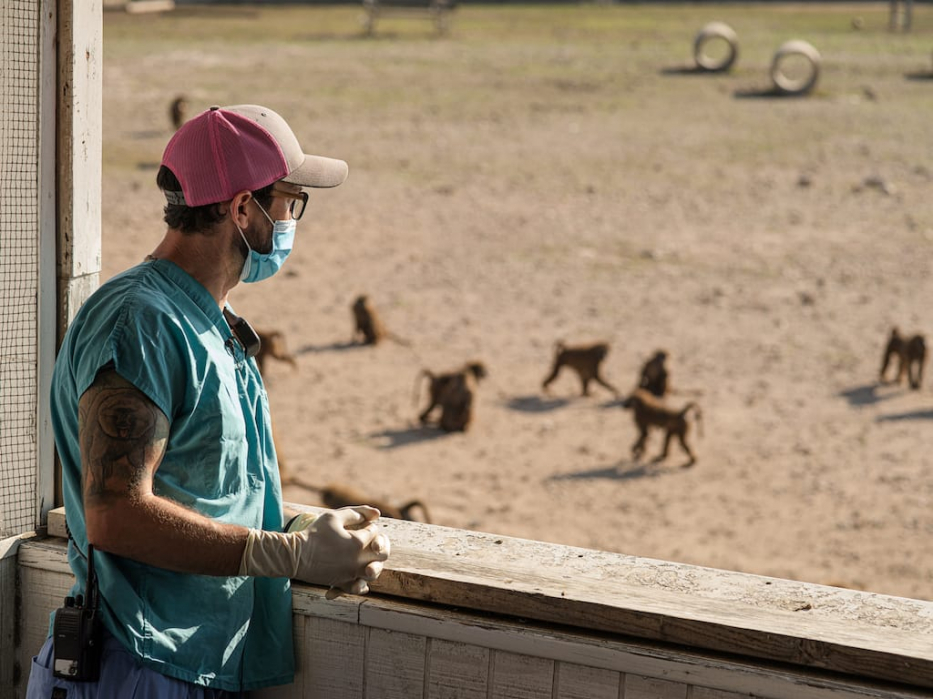Story highlights the national research primate shortage and balances concerns around animals in biomedical research with the global need to develop vaccines and cures that help both animals and people.

Texas Biomed is featured in a Texas Monthly story that details how our infectious disease research enabled the fastest development of a vaccine in history, which helped slow a raging pandemic and save countless lives. The magazine piece highlights the strategic growth of the Institute, its vision for the future and the role of its Southwest National Primate Research Center (SNPRC).
Reporter Will Bostwick wrote: for each animal used in COVID research…, “countless more human lives were saved. Infectious disease experts worldwide agree that there will be other pandemics, and Texas Biomed intends to help develop the next cures.”
The story goes on to lay out a fundamental crux of biomedical research: to develop cures and vaccines, nonhuman primates are a required and important part of the process. Not only because the Food and Drug Administration requires that most treatments be tested in animals before being given to humans, but also because the technologies that one day aim to replace animals in research are not advanced enough to adequately replicate a complete biological system.
In the article, Texas Biomed’s President/CEO Larry Schlesinger and SNPRC Director Corinna Ross share how deeply committed Texas Biomed and SNPRC are providing the absolute best care to its animals. Dr. Schlesinger spoke about the Institute’s work to address the current national shortage of research primates by expanding animal housing and research space.
Here are a few excerpts from the story:
Thomas Slick Jr., an eccentric 26-year-old heir to an oil fortune, founded what became Texas Biomed on a working cattle ranch eight miles west of downtown San Antonio, in 1941. Much of its early work was devoted to livestock breeding, including the creation of a popular Brangus hybrid that combined the virtues of Brahman and Angus cattle. Slick later became a world traveler who led expeditions in search of the yeti in the Himalayas and Sasquatch in the Pacific Northwest.
In the fifties, the institute turned its attention to biomedical research and began importing baboons from Africa. By the eighties, it was testing early treatments for HIV and hepatitis C. In 1999 it established the Southwest National Primate Research Center, one of only seven such facilities in the country funded by the National Institutes of Health and the only one not associated with a university. Today it’s home to roughly five hundred marmosets, one thousand baboons (the world’s largest colony), and 1,500 macaques.
When the COVID-19 pandemic began, China, the United States’ top source for nonhuman primates, decided to begin keeping its supply to itself. This led to a bottleneck in animal-research projects elsewhere in the world. Cambodia, the next top supplier, partially filled the gap, but in November 2022 it, too, halted exports, out of concerns that it was contributing to the poaching of endangered wild macaques. Experts say the primate shortage has compromised critical biomedical research in the U.S., and Texas Biomed’s leaders have determined that the institute should help bolster the domestic supply.
***
Much as Houston’s MD Anderson is known as the premier cancer center in the U.S., Texas Biomed aspires to be the premier infectious disease institute. “In Texas we’re not known enough,” Schlesinger says. “I don’t think people appreciate just how much power we have in science.” In addition to its work on Pfizer’s COVID-19 vaccine, Texas Biomed was involved in developing Regeneron Pharmaceuticals’ monoclonal antibody therapy, as well as in major advances for hepatitis C patients that led to a 2020 Nobel Prize for some of its collaborators. Ebola therapies and vaccines tested in the institute’s Biosafety Level 4 lab have also shown promise. And last year the NIH selected the institute as a training center for tuberculosis researchers.
None of this would be possible without its nonhuman primates, Schlesinger insists.
***
“We’re at the cutting edge of science that will enable us to replace monkeys someday,” Schlesinger agrees. “We want that more than anyone. Animals are very expensive, labor intensive, and require a lot of care.” But Schlesinger pushes back against those who say animal testing should be supplanted immediately by the new options. “The reality is it’s not ready for prime time,” he says of the emerging technology.
***
Though the Food and Drug Administration has signaled that it will accept alternatives to animal testing in some cases, a congressionally mandated report published this year by the National Academies of Science, Engineering, and Medicine found that none of the alternatives can fully replace nonhuman-primate testing—at least not yet.
***
“I’m thinking about solving the world’s problems,” he (Schlesinger) says. “The goal is to use less animals, to use them in a more sophisticated fashion whenever possible, and to make sure that the studies are validated, so that the work done actually moves forward in the proper fashion. That’s what we can do. And that’s what I think Texas Biomed does really well.”
***
A Pfizer senior director would later say this swift action by the institute put the pharmaceutical giant a month ahead in getting its vaccine to the public. For each of the dozens of animals sacrificed, it could be argued, countless more human lives were saved. Infectious disease experts worldwide agree that there will be other pandemics, and Texas Biomed intends to help develop the next cures.
Read the full article here.